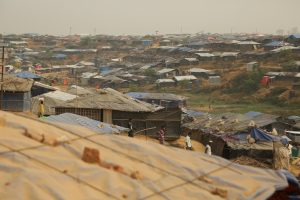The Myanmar government’s horrific treatment of the Muslim Rohingya communities of western Myanmar has presented the Association of Southeast Asian Nations (ASEAN) with a stern test. According to a coalition of regional lawmakers, it is a test that the Southeast Asian bloc has roundly failed.
In a new report released on October 20, ASEAN Parliamentarians for Human Rights (APHR) argues that the grouping has failed to respond effectively to the Rohingya crisis in Myanmar, due to a lack of leadership, structural shortcomings and a failure to grasp the full gravity of rights abuses that have unfolded there.
Crisis is an inadequate word for the situation that has unfolded in Myanmar’s Rakhine State over the past few years. In August 2017, the Myanmar military led a brutal clearance operation in northern Rakhine, allegedly in response to scattered attacks by Rohingya militants. Over the subsequent weeks, it razed villages, shot civilians, raped girls and women, and drove more than 700,000 people over the border into Bangladesh.
Meanwhile, most of the Rohingya that remain in Rakhine languish in an archipelago of ghetto-like internal displacement camps for that rights groups have likened to a form of apartheid. The situation has only worsened since the forced displacement of the Rohingya, as fierce fighting has broken out in northern Rakhine State between the Myanmar military and the insurgent Arakan Army (AA).
The APHR report acknowledges that the Rohingya crisis is a routine agenda item at ASEAN Summits and other meetings. But it argues that the 10-member bloc has been hampered by its own institutional structure – based around the principles of mutual non-interference and consensus-based decision making – which has allowed the Myanmar government the space to “set the parameters of ASEAN’s engagement” on the Rohingya issue.
“Caught between respect for its key principles of consensus and non-interference on the one hand, and international and domestic outcry on the other,” APHR report states, “the regional bloc has struggled to respond to the crisis and articulate a clear vision and strategy that would help end the cycle of violence and displacement.”
In particular, the group argues, ASEAN’s efforts to resolve the Rohingya have limited it to specific elements of the crisis, such as humanitarian assistance and the repatriation of refugees from Bangladesh, two issues that unsurprisingly command the support of the Myanmar government. Meanwhile, it has mostly ignored the underlying questions such as the restoration of citizenship rights and enforced ethnic segregation, which in turn are based on ethnic and sectarian divisions with deep roots in Myanmar’s modern history.
“How can we talk about Rohingya refugees returning to Rakhine State, when that area remains an active war zone?” Charles Santiago, a Malaysian parliamentarian who chairs the APHR board, told a press conference to release the report. He said that ASEAN’s attempt to address the crisis within the confines of its “non-interference” principle have led to it being “at best counter-productive and at worst actively contributing to human rights abuses.”
Consensus and non-interference have been central to ASEAN since its founding as in 1967. These principles were initially a pragmatic means of bridging a wide diversity of interests between the five founding members of ASEAN, and to override the nationalist squabbles that had previously dogged their relations. The focus on “non-interference” is also a vestige of the region’s experience of Western imperialism, which inculcated a fierce nationalism and a zealous defense of the norm of national sovereignty.
Discarding principles that are hard-wired into ASEAN will be difficult, but the APHR report points out that the bloc has already pushed some boundaries over the Rohingya issue, especially its founding principle of non-interference. The question is how much further ASEAN’s member states will be able – or willing – to stretch this principle in order to address one of the worst human rights crises in the world today.
Increased efforts from ASEAN are not sufficient to bring the Rohingya crisis to some kind of conclusion – but they are necessary.

































